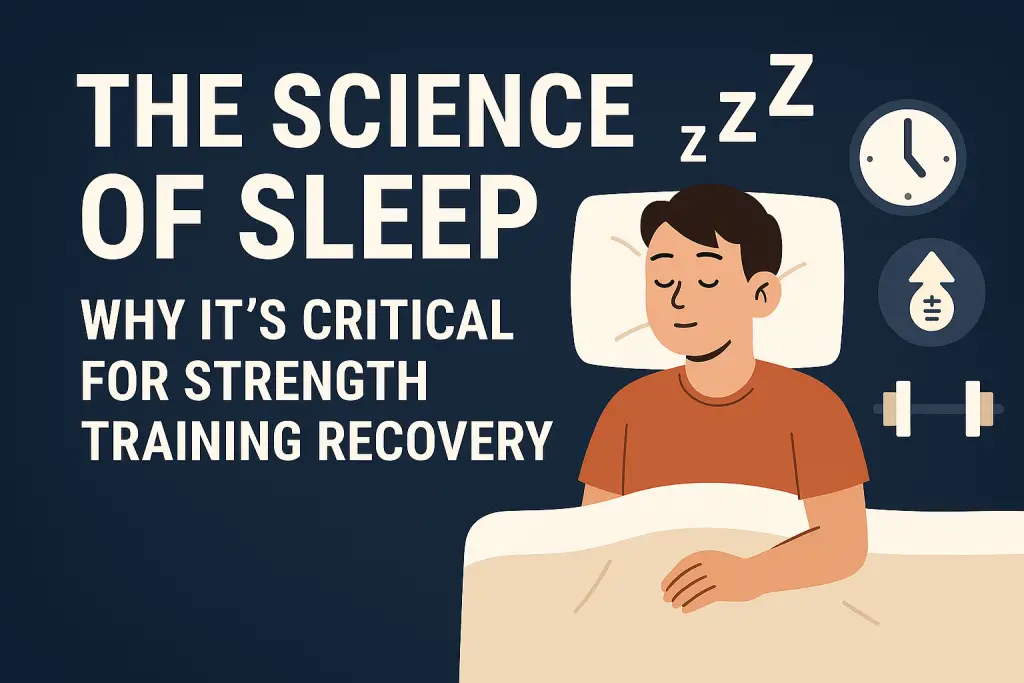The Science of Sleep: Why It’s Critical for Strength Training Recovery

Sleep is often overlooked in strength training — yet it’s one of the most powerful tools you have to build muscle, recover faster, and maximize performance. While training stresses your muscles, it’s during sleep that your body actually repairs, rebuilds, and grows stronger.
This article breaks down what the science says about sleep and strength training recovery — in simple terms you can actually apply.
What Happens to Your Body During Sleep?
When you sleep, especially during deep stages of sleep, your body activates several important recovery processes:
- Muscle protein synthesis increases
- Growth hormone is released in higher amounts
- Inflammation is reduced
- Tissues repair and rebuild
- The central nervous system recharges
One study in Sports Medicine explains that sleep deprivation disrupts these processes, impairing recovery, hormonal balance, and even strength output in subsequent workouts (Simpson et al., 2017).
How Much Sleep Do You Need for Muscle Growth?
While most adults are told to aim for 7–9 hours per night, research suggests strength athletes and serious lifters may need even more due to higher recovery demands.
A review published in International Journal of Sports Medicine suggests that athletes generally benefit from 8–10 hours of sleep per night for optimal recovery and performance (Fullagar et al., 2015).
The more intense your training — especially heavy, high-volume lifting — the more sleep your body may require to fully recover.
Sleep Loss Directly Impacts Strength and Muscle Gains
Several studies show that even partial sleep deprivation can blunt performance and muscle growth:
- A study published in Sleep found that just one night of sleep loss reduced maximal strength output the following day (Reyner & Horne, 2013).
- Another study in Journal of Clinical Endocrinology & Metabolism found that reduced sleep led to decreased testosterone levels, which can impact muscle growth potential (Leproult & Van Cauter, 2011).
- Chronic sleep restriction also leads to higher cortisol levels — a catabolic hormone associated with muscle breakdown (Dattilo et al., 2011).
In short: consistent poor sleep makes it harder to build strength and muscle over time.
How Poor Sleep Affects Recovery
Lack of sleep affects more than just your physical strength. It can also:
- Increase soreness (delayed onset muscle soreness)
- Impair reaction time and coordination
- Slow down glycogen replenishment
- Decrease motivation to train
- Reduce mental focus during workouts
A 2013 review in Current Sports Medicine Reports explains that insufficient sleep not only delays muscle repair but also compromises the immune system’s role in recovery (Kellmann, 2010).
Sleep Quality Matters Too
Quantity of sleep is important, but quality matters just as much. Deep sleep stages (slow-wave sleep) are where most recovery processes occur.
Common factors that hurt sleep quality include:
- Inconsistent sleep schedule
- Screen time before bed (blue light exposure)
- Alcohol or caffeine too close to bedtime
- Elevated stress or anxiety
Improving sleep hygiene — your sleep habits and environment — can significantly improve both recovery and performance.
Simple Ways to Improve Sleep for Recovery
Here are science-supported tips that can help you sleep better:
1️⃣ Consistent schedule: Go to bed and wake up at the same time daily.
2️⃣ Dark, cool room: 60–68°F (15–20°C) promotes better deep sleep.
3️⃣ Limit screens: Avoid blue light 60–90 minutes before bed (Chang et al., 2015).
4️⃣ Evening relaxation: Meditation, light stretching, or reading can help lower cortisol before bed.
5️⃣ Limit caffeine: Avoid caffeine 6+ hours before bedtime.
6️⃣ Supplement carefully: Magnesium or glycine may promote relaxation (consult a healthcare provider before starting any supplement).
Napping for Recovery: Do Short Naps Help?
Yes — research supports that short naps can improve recovery when nightly sleep is insufficient.
- A study in International Journal of Sports Physiology and Performance found that 20–30 minute naps improved reaction time, mood, and perceived recovery in athletes (Vitale et al., 2019).
While naps shouldn’t replace full nightly sleep, they can be a useful recovery tool when used strategically.
Summary: Why Sleep Is Non-Negotiable for Strength Training
- Sleep is where your body repairs, grows, and adapts to training.
- Consistent 8–9 hours is ideal for most strength athletes.
- Chronic poor sleep slows strength gains, increases injury risk, and impairs performance.
- Sleep quality (not just hours) makes a big difference.
- Small improvements in sleep habits can lead to noticeable improvements in recovery and strength gains.
Related Tools and Resources
- 👉 Use our Sleep Recovery Calculator to estimate your sleep needs
- 👉 How Much Sleep Do You Really Need for Muscle Recovery?
- 👉 5 Signs You’re Not Recovering From Strength Training